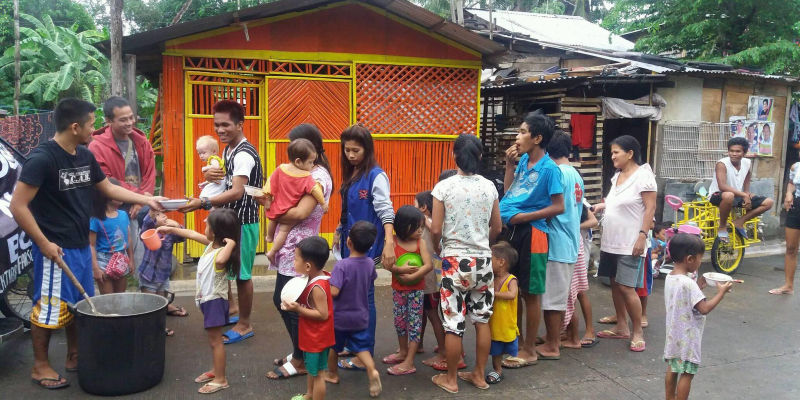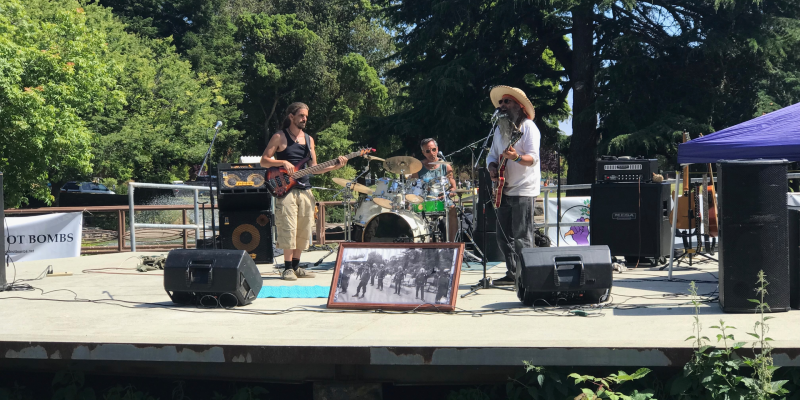This Refugee Week we hear from the co-founder of Food Not Bombs, an organisation dedicated to feeding the hungry
 Refugee Week 2025 will be held from 16–22 June, honouring the resilience, contributions and voices of refugees. It’s a time to come together in solidarity, share stories and celebrate the strength found in sanctuary.
Refugee Week 2025 will be held from 16–22 June, honouring the resilience, contributions and voices of refugees. It’s a time to come together in solidarity, share stories and celebrate the strength found in sanctuary.
Activist Keith McHenry has spent a lifetime sharing the values of veganism, community and nonviolent direct action. He co-founded Food Not Bombs in 1980, a not-for-profit organisation which protests war and poverty through providing free meals to refugees, homeless people, those affected by natural disasters and anyone else in need.
Content warning: discussion of animal slaughter and racism
Vegan origins
When I was around 15, my mom and I moved to a house where we had some land. I helped to build a barn, and we wanted to have chickens and goats. I ordered fertile eggs online and hatched them under my bed. The chicks were just so cute – really lovely.
One day my dad said we had too many roosters and we needed to kill some. He showed me what to do, and even before I killed the first chicken the whole barnyard was freaking out. The goats were smashing against the walls, cats were screaming and of course the roosters and hens were out of control. I thought – there's something wrong, and I can’t kill this chicken, and I can’t eat meat anymore.
Creating Food Not Bombs
A few years later I was an art student at Boston University, studying painting and sculpture. I was also a produce worker at a natural food store called Bread and Circus. I would set up the produce bins before work, and I would take all the wilted vegetables and fruit down to these public housing projects for people in need.
I was involved in protests against nuclear weapons and nuclear power, and bringing food and protest together I got the idea for Food Not Bombs – an all-volunteer movement that recovers food that would otherwise be discarded, and shares free vegan and vegetarian meals with the hungry.
A group of eight of us got together, and we were all vegan. It made sense that we would advocate for a vegan lifestyle. We started by doing street theatre against the nuclear arms race, which was really effective. People would stop and watch, and eat our baked goods.
Shared values
Food Not Bombs has three principles. The food is always free to anyone whether they are rich or poor, drunk or sober.
Secondly, each group is autonomous and there are no presidents or directors, and we involve the people eating with us to help determine the direction of the local chapter. Here where I am in Santa Cruz, four of the ten of us that currently meet are currently homeless or were recently homeless.
And thirdly, we are not a charity, but we’re dedicated to nonviolent direct action to change society, so no one has to eat at a soup kitchen or live on the streets.
Creating a logo
Shortly after the group was created, we rented a Food Not Bombs house. It had two bedrooms, but we would bring everyone home with us who needed it, so sometimes we had twenty or thirty of us staying there.
There was a little pantry that was my art studio because I was starting a graphic design business. We decided we wanted a logo as a unifying image. I had my brother hold his fist up with a carrot and then I did the drawing that became the logo. Coming from a radical left or anarchist perspective we wanted to have the fist, showing unity and power. The carrot symbolised a grassroots organisation and feeding people, and the leaves kind of look like flames like the Statue of Liberty’s torch.
At first it was just black and white as colour was so expensive. But later we made the hand purple, as we didn’t want to align with any particular race, and it looks great with the orange and green carrot. The colour combination really pops.
I’ve never copywritten the logo and therefore it goes all over the world. I’ve seen a version from Germany that looked like a woodblock. And then I’ve seen in Asia the carrot replaced by a rice plant. I just love the fact it can be morphed into anything.
 Food recovery
Food recovery
In the late 80s I made a flyer called ‘7 steps to start Food Not Bombs’, to show people how to best help refugees, homeless people and anyone else in food poverty.
The first thing a chapter is encouraged to do is to set up a network of people donating food. I suggest people to go to their local neighbourhood grocery stores, in the morning when the produce worker is there. Ask about food they are throwing away and say you’re feeding people, and you’ll take what they have. It usually takes a few visits to show you’re serious, and you need to be consistent. Eventually they start holding it back for you. A key part of food recovery is developing personal relationships with the workers who can supply the food.
It's rare to get donations of rice and beans and dry goods, so we would hold concerts to fundraise, or use our own money to buy those ingredients.
Every year we do a concert called Soupstock to celebrate the anniversary of Food Not Bombs. The biggest was the 20th anniversary in San Francisco – about 18,000 people showed. People could attend for free, but we managed to bring in around $20,000 handing out free food with free music, because people wanted to donate. We find that being very non-aggressive with fundraising encourages more donations.
Natural disasters
The first natural disaster Food Not Bombs participated in supporting was the Loma Prieta earthquake in 1989. We were the only free food available in San Francisco for three days after the earthquake and then finally the Red Cross showed up.
The biggest disaster we supported at was Katrina. For eight months we were principally the only ongoing food in New Orleans.
Recently we've been doing a lot of cyclone work in the Philippines, and also supporting people throughout the fires here in Santa Cruz. We were very busy during Covid. All the indoor food programmes were shut down because of Covid restrictions, and we were providing the only meals for homeless people here for three years.
Sustainable activism
I think I’m made from something different than most people because for some reason seeing all this pain and suffering does not emotionally destroy me like it does for many. But I’ve been doing this for 50 years, and I’ve learned a lot along the way. Mainly I try to have fun doing the work. It’s about community, getting together, feeling the love from everyone there and having fun. Like the concerts – more than just raising the money, it’s for building people together and enjoying it. What blows my mind about Food Not Bombs is that people will come up with really creative ideas, which keeps their spirits up.
I would encourage everyone to have fun at your actions, to realise that change will take a long time and to not get discouraged. Read history too. When I was a kid, we had ‘coloured-only’ bathrooms and water fountains at my school and in my town. And eventually through massive protests we had desegregation. It takes a long time, but the arc of justice that Martin Luther King talked about does seem to be true.
If you’d like to get involved, volunteer with Food Not Bombs or set up a local chapter!
As told to Elena Orde
Become a member of The Vegan Society, to contribute towards our vital work across the vegan movement. Your support funds a wide range of impactful projects that promote and protect veganism. As a member, you’ll enjoy exclusive access to The Vegan magazine, expert nutritional guidance and a host of other benefits. Ready to make a difference? Join today!
The views expressed by our bloggers are not necessarily the views of The Vegan Society.

